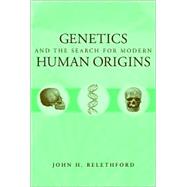Genetics and the Search for Modern Human Origins
, by Relethford, John H.- ISBN: 9780471384137 | 0471384135
- Cover: Hardcover
- Copyright: 4/20/2001
A major debate in anthropology concerns the relationship between anatomically modern humans and earlier "archaic" humans including the Neandertals. What was the origin of modern humans? Did we arise as a new species in Africa 200,000 years ago and then replace archaic human populations outside of Africa, or are our origins part of a single evolving lineage extending back over the past two million years? In addition to fossil and archaeological evidence, anthropologists have increasingly turned to using genetic data on living populations to address this question. Patterns of genetic variation within and between living human populations are felt to contain clues as to our species' evolutionary history, and provide a reflection of the past. This book reviews the modern human origins debate focusing on the genetic evidence relating to our origins, including genetic variation in living humans and recent discoveries of ancient DNA from fossil specimens. Following a brief introduction to the problem and a review of evolutionary genetics, the book focuses on gene trees and the search for a common ancestor, genetic diversity within populations, genetic distances between populations, the use of genetic data to reconstruct ancient demography, and Neandertal DNA. The main point of the text is that although the genetic data are often compatible with a replacement model, they are also compatible with some multiregional models. The concluding chapter makes the case that modern human origins are mostly, but not exclusively, out of Africa.







